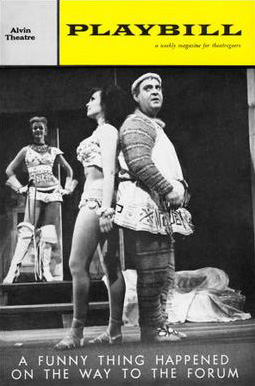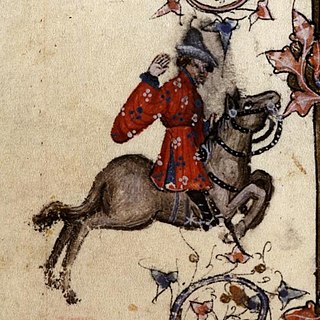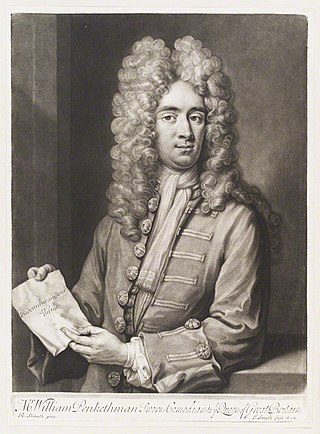
A Funny Thing Happened on the Way to the Forum is a musical with music and lyrics by Stephen Sondheim and book by Burt Shevelove and Larry Gelbart.

"The Merchant's Tale" is one of Geoffrey Chaucer's Canterbury Tales. In it Chaucer subtly mocks antifeminist literature like that of Theophrastus ("Theofraste"). The tale also shows the influence of Boccaccio, Deschamps' Le Miroir de Mariage, Roman de la Rose by Guillaume de Lorris, Andreas Capellanus, Statius, and Cato. The tale is found in Persia in the Bahar Danush, in which the husband climbs a date tree instead of a pear tree. It could have arrived in Europe through the One Thousand and One Nights, or perhaps the version in book VI of the Masnavi by Rumi. Though several of the tales are sexually explicit by modern standards, this one is especially so. Larry Benson remarks:
The central episode of the Merchant's Tale is like a fabliau, though of a very unusual sort: It is cast in the high style, and some of the scenes are among Chaucer's most elaborate displays of rhetorical art.

The wise old man is an archetype as described by Carl Jung, as well as a classic literary figure, and may be seen as a stock character. The wise old man can be a profound philosopher distinguished for wisdom and sound judgment.

Twelfth Night, or What You Will is a romantic comedy by William Shakespeare that is believed to have been written around 1601–1602 as a Twelfth Night entertainment for the close of the Christmas season. The play centres on the twins Viola and Sebastian, who are separated in a shipwreck. Viola falls in love with the Duke Orsino, who in turn is in love with Countess Olivia. Upon meeting Viola, Countess Olivia falls in love with her thinking she is a man.
Old man, Old Man or The Old Man may refer to:
A senex amans is a stock character of classical Greek and Roman comedy, medieval literature and drama. It is an old jealous man married to a young woman and thus often an object of mockery. He is variously ugly, impotent, puritanical, and foolish to be cuckolded by a young and handsome man. Often the term senex amans is applied to the very motif involving the three.
Senhor, from the Latin Senior, is the Portuguese word for lord, sir or mister. Its feminine form is senhora. The term is related to Spanish señor, Catalan senyor, Occitan sénher, French seigneur, and Italian signore.

Alazṓn is one of three stock characters in comedy of the theatre of ancient Greece. He is the opponent of the eirôn. The alazṓn is an impostor that sees himself as greater than he actually is. The senex iratus and the miles gloriosus are two types of alazṓn.

The Man of Mode, or, Sir Fopling Flutter is a Restoration comedy by George Etherege, written in 1676. The play is set in Restoration London and follows the womanizer Dorimant as he tries to win over the young heiress Harriet and to disengage himself from his affair with Mrs. Loveit. Despite the subtitle, the fop Sir Fopling is only one of several minor characters; the rake Dorimant is the protagonist.
The Mulberry-Garden is a comedy by Restoration poet and playwright Sir Charles Sedley (1639-1701) and was published in 1668

As You Like It is a pastoral comedy by William Shakespeare believed to have been written in 1599 and first published in the First Folio in 1623. The play's first performance is uncertain, though a performance at Wilton House in 1603 has been suggested as a possibility.

Love for Love is a Restoration comedy written by English playwright William Congreve. It premiered on 30 April 1695 at the Lincoln's Inn Fields Theatre. Staged by Thomas Betterton's company the original cast included Betterton as Valentine, William Smith as Scandal, John Bowman as Tattle, Thomas Doggett as Ben, Samuel Sandford as Foresight, William Bowen as Jeremy, John Freeman as Buckram, Anne Bracegirdle as Angelica, Elizabeth Bowman as Mrs Foresight, Elizabeth Barry as Mrs Frail, Elinor Leigh as Nurse and Abigail Lawson as Jenny.

William Pinkethman was an English comic actor, a low comedian with a droll style, and theatre manager. He was considered an imitator of Anthony Leigh.

Robert Shallow is a fictional character who appears in Shakespeare's plays Henry IV, Part 2 and The Merry Wives of Windsor. He is a wealthy landowner and Justice of the Peace in Gloucestershire, who at the time of The Merry Wives of Windsor is said to be over 80.
This page is based on this
Wikipedia article Text is available under the
CC BY-SA 4.0 license; additional terms may apply.
Images, videos and audio are available under their respective licenses.









